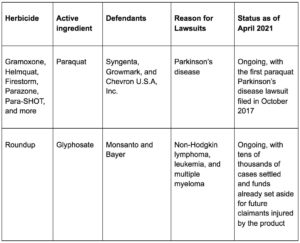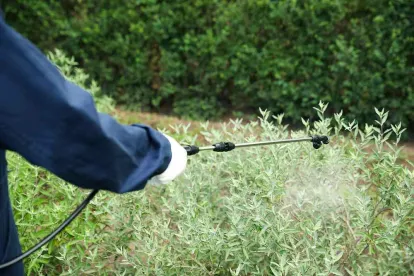Agricultural workers who were exposed to the herbicide paraquat and have been diagnosed with Parkinson’s disease may have a claim for financial compensation.
With lawsuits against paraquat manufacturers already filed in multiple states, attorneys are now investigating paraquat lawsuit cases at no charge.
A paraquat toxic exposure lawsuit may be your only chance to receive the compensation you need to cover the costs of treating Parkinson’s disease.
What You Need to Know About Paraquat and Parkinson’s Disease
Dozens of countries around the world have banned the use of paraquat, a weed killer so toxic that ingesting a single sip can be deadly, according to The New York Times.
In the United States, paraquat use isn’t just legal—it’s on the rise. The total amount of paraquat usage in the U.S. doubled between 2006 and 2016, the National Water-Quality Assessment (NAWQA) Project reported.
That increase in usage translates to an increase in exposure to paraquat and to the harms linked to the toxic chemical. Numerous research studies have shown that, besides posing a risk of potentially deadly paraquat poisoning, the herbicide can increase your risk of developing Parkinson’s disease.
The American Journal of Epidemiology, JAMA (Journal of the American Medical Association) Neurology, and the National Institute of Environmental Health Sciences are just a few of the sources that have published research pointing to a link between paraquat and Parkinson’s disease.
The Unified Parkinson’s Advocacy Council submitted a letter to the Environmental Protection Agency (EPA) in which it noted, “Recent research links paraquat and several other herbicides to the development of Parkinson’s pathology and symptoms.” In the letter, the Unified Parkinson’s Advocacy Council urged the EPA to ban the use of the herbicide in the U.S., which, as of April 2021, the agency has not done.
The first lawsuits against paraquat manufacturers pertaining to the Parkinson’s disease risk were filed in October 2017 in Illinois. Farmers and agriculture workers in other states have since commenced legal action to hold the makers of the herbicide accountable, Bloomberg reported.
Paraquat Herbicide Lawsuit FAQs
What Is Paraquat Herbicide?
Paraquat is a fast-acting, non-selective contact weed killer. One of the most popular herbicides containing paraquat in the United States is Gramoxone SL 2.0 Herbicide, manufactured by Syngenta.
Other paraquat herbicide trade names include:
- Para-SHOT
-
Helmquat
-
Parazone
-
Firestorm
-
Ortho-Paraquat
-
Quick-Quat
-
Devour
-
Blanco
The paraquat manufacturers named in lawsuits so far include Syngenta, Growmark, and Chevron U.S.A, Inc.
Is Paraquat in Roundup?
No, paraquat is not the active ingredient found in Roundup. While the herbicide Roundup has also been the subject of lawsuits—more than 125,000 of them—in recent years, the active ingredients and the specific health risks associated with these chemicals are different.

The makers of herbicides containing paraquat are facing lawsuits over the link between the toxic chemical and Parkinson’s Disease. Monsanto, the company that first made Roundup, and Bayer, the parent company that now owns Monsanto, are facing lawsuits over evidence of a link between cancer and the active ingredient in Roundup.
What Is Parkinson’s Disease?
Parkinson’s disease is a neurodegenerative disorder in which nerve cells in a part of the brain called the substantia nigra don’t produce enough of the neurotransmitter dopamine, according to the Parkinson’s Foundation. Not having enough dopamine is what causes the movement symptoms that distinguish Parkinson’s disease, including tremors, limb rigidity, and gait problems.
Although it is a movement disorder, Parkinson’s disease can bring about non-movement symptoms that include cognitive impairment, depression, sleep disorders, and constipation, according to the Parkinson’s Foundation.
Parkinson’s disease is a progressive disorder. This means the disease gets worse over time. Although Parkinson’s disease is incurable, its symptoms are treatable. Data from some clinical research trials suggest that there is hope to slow Parkinson’s disease progression through early intervention, although there’s not enough data to “conclusively demonstrate” that this is possible, according to The American Journal of Managed Care.
What Should I Know If I’m Considering a Paraquat Lawsuit?
If you’re thinking of joining a paraquat lawsuit, here’s what you need to know:
-
You may be able to seek compensation for all of your damages, including medical costs, lost wages, pain and suffering, and declines in your quality of life.
-
There are deadlines to file toxic exposure lawsuits and in-depth investigations that must be performed, so the sooner you get started, the better.
-
You will need the help of an experienced paraquat lawsuit lawyer to prove that exposure to the herbicide is what caused you to develop Parkinson’s disease.
-
It costs you nothing out of pocket to get started with a claim. The consultation is free, and legal representation is offered on a no-win, no-fee basis.
For licensed applicators and other agricultural workers who developed Parkinson’s disease after being exposed to paraquat, getting financial compensation will help you afford the best care. That, in turn, will help you have the best quality of life.




 />i
/>i

